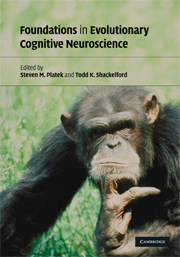Book contents
- Frontmatter
- Contents
- List of contributors
- 1 Introduction to evolutionary psychology: A Darwinian approach to human behavior and cognition
- 2 The evolution of general fluid intelligence
- 3 The role of a general cognitive factor in the evolution of human intelligence
- 4 Where there is an adaptation, there is a domain: The form-function fit in information processing
- 5 Invention and community in the emergence of language: Insights from new sign languages
- 6 Origins of the language: Correlation between brain evolution and language development
- 7 The evolutionary cognitive neuropsychology of face preferences
- 8 Sex differences in the neural correlates of jealousy
- Index
2 - The evolution of general fluid intelligence
Published online by Cambridge University Press: 20 January 2010
- Frontmatter
- Contents
- List of contributors
- 1 Introduction to evolutionary psychology: A Darwinian approach to human behavior and cognition
- 2 The evolution of general fluid intelligence
- 3 The role of a general cognitive factor in the evolution of human intelligence
- 4 Where there is an adaptation, there is a domain: The form-function fit in information processing
- 5 Invention and community in the emergence of language: Insights from new sign languages
- 6 Origins of the language: Correlation between brain evolution and language development
- 7 The evolutionary cognitive neuropsychology of face preferences
- 8 Sex differences in the neural correlates of jealousy
- Index
Summary
The evolution of general fluid intelligence
In the decades following Darwin's (1859) publication of On the Origin of Species, there was a flurry of proposals and theories regarding human evolution (Darwin, 1871; Huxley, 1863; Wallace, 1864), including the evolution of human intelligence. The proposals of these early evolutionists were very similar to theories of cognitive and intellectual evolution offered by this generation's theorists (Alexander, 1989; Ash and Gallup, 2007; Dunbar, 1998; Flinn, Geary, and Ward, 2005; Geary, 2005; Kanazawa, 2004, 2007; Kaplan, Hill, Lancaster, and Hurtado, 2000; Miller, 2000; Mithen, 1996, 2007). Many of the themes and contrasting views that emerged during the middle decades of the nineteenth century are echoed by theorists in the first decade of the twenty-first century. The central theme that cuts across generations and theories is that the core of intelligence is the ability to anticipate and predict variation and novelty and to devise strategies to cope with this novelty. The core issue that divides theorists is the source of novelty; specifically, whether the primary source of this variation is due to climatic change, the vagaries and nuances of hunting other species, or from the dynamics of competition within and between human groups. Darwin (1871, pp. 158–160) suggested that each of these contributed to the evolution of human intelligence:
He [humans] has great power of adapting his habits to new conditions of life. He invents weapons, tools and various stratagems, by which he procures food and defends himself. When he migrates into a colder climate he uses clothes, builds sheds, and makes fires; and, by the aid of fire, cooks food otherwise indigestible. […]
- Type
- Chapter
- Information
- Foundations in Evolutionary Cognitive Neuroscience , pp. 22 - 56Publisher: Cambridge University PressPrint publication year: 2009
- 6
- Cited by

